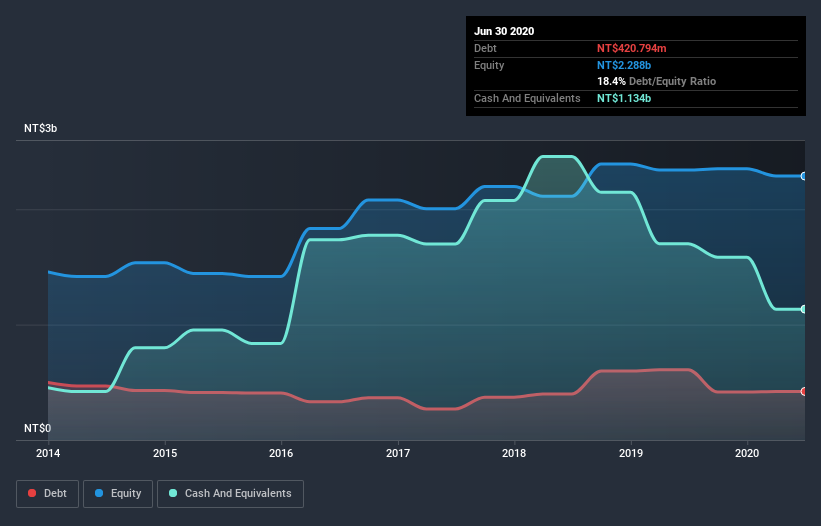
Howard Marks put it nicely when he said that, rather than worrying about share price volatility, 'The possibility of permanent loss is the risk I worry about... and every practical investor I know worries about.' When we think about how risky a company is, we always like to look at its use of debt, since debt overload can lead to ruin. Importantly, Dee Van Enterprise Co., Ltd. (GTSM:8115) does carry debt. But the more important question is: how much risk is that debt creating?
Why Does Debt Bring Risk?
Generally speaking, debt only becomes a real problem when a company can't easily pay it off, either by raising capital or with its own cash flow. Ultimately, if the company can't fulfill its legal obligations to repay debt, shareholders could walk away with nothing. While that is not too common, we often do see indebted companies permanently diluting shareholders because lenders force them to raise capital at a distressed price. Of course, plenty of companies use debt to fund growth, without any negative consequences. The first step when considering a company's debt levels is to consider its cash and debt together.
See our latest analysis for Dee Van Enterprise
What Is Dee Van Enterprise's Debt?
You can click the graphic below for the historical numbers, but it shows that Dee Van Enterprise had NT$420.8m of debt in June 2020, down from NT$608.7m, one year before. However, its balance sheet shows it holds NT$1.13b in cash, so it actually has NT$713.4m net cash.

How Strong Is Dee Van Enterprise's Balance Sheet?
Zooming in on the latest balance sheet data, we can see that Dee Van Enterprise had liabilities of NT$1.36b due within 12 months and liabilities of NT$608.2m due beyond that. On the other hand, it had cash of NT$1.13b and NT$817.3m worth of receivables due within a year. So these liquid assets roughly match the total liabilities.
This state of affairs indicates that Dee Van Enterprise's balance sheet looks quite solid, as its total liabilities are just about equal to its liquid assets. So while it's hard to imagine that the NT$1.26b company is struggling for cash, we still think it's worth monitoring its balance sheet. Despite its noteworthy liabilities, Dee Van Enterprise boasts net cash, so it's fair to say it does not have a heavy debt load!
Even more impressive was the fact that Dee Van Enterprise grew its EBIT by 975% over twelve months. If maintained that growth will make the debt even more manageable in the years ahead. When analysing debt levels, the balance sheet is the obvious place to start. But you can't view debt in total isolation; since Dee Van Enterprise will need earnings to service that debt. So if you're keen to discover more about its earnings, it might be worth checking out this graph of its long term earnings trend.
Finally, a business needs free cash flow to pay off debt; accounting profits just don't cut it. Dee Van Enterprise may have net cash on the balance sheet, but it is still interesting to look at how well the business converts its earnings before interest and tax (EBIT) to free cash flow, because that will influence both its need for, and its capacity to manage debt. Looking at the most recent three years, Dee Van Enterprise recorded free cash flow of 44% of its EBIT, which is weaker than we'd expect. That's not great, when it comes to paying down debt.
Summing up
While it is always sensible to look at a company's total liabilities, it is very reassuring that Dee Van Enterprise has NT$713.4m in net cash. And we liked the look of last year's 975% year-on-year EBIT growth. So we don't think Dee Van Enterprise's use of debt is risky. There's no doubt that we learn most about debt from the balance sheet. But ultimately, every company can contain risks that exist outside of the balance sheet. Be aware that Dee Van Enterprise is showing 5 warning signs in our investment analysis , and 1 of those shouldn't be ignored...
At the end of the day, it's often better to focus on companies that are free from net debt. You can access our special list of such companies (all with a track record of profit growth). It's free.
When trading Dee Van Enterprise or any other investment, use the platform considered by many to be the Professional's Gateway to the Worlds Market, Interactive Brokers. You get the lowest-cost* trading on stocks, options, futures, forex, bonds and funds worldwide from a single integrated account. Promoted
New: Manage All Your Stock Portfolios in One Place
We've created the ultimate portfolio companion for stock investors, and it's free.
• Connect an unlimited number of Portfolios and see your total in one currency
• Be alerted to new Warning Signs or Risks via email or mobile
• Track the Fair Value of your stocks
This article by Simply Wall St is general in nature. It does not constitute a recommendation to buy or sell any stock, and does not take account of your objectives, or your financial situation. We aim to bring you long-term focused analysis driven by fundamental data. Note that our analysis may not factor in the latest price-sensitive company announcements or qualitative material. Simply Wall St has no position in any stocks mentioned.
*Interactive Brokers Rated Lowest Cost Broker by StockBrokers.com Annual Online Review 2020
Have feedback on this article? Concerned about the content? Get in touch with us directly. Alternatively, email editorial-team@simplywallst.com.
About TPEX:8115
Dee Van Enterprise
Dee Van Enterprise Co., Ltd. engages in the development, production, and sale of external power supply products in Taiwan and internationally.
Flawless balance sheet average dividend payer.


